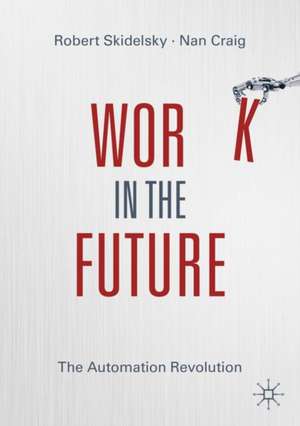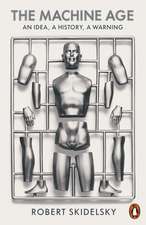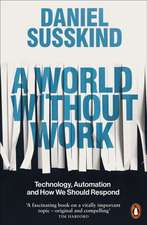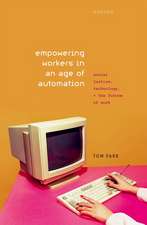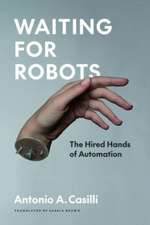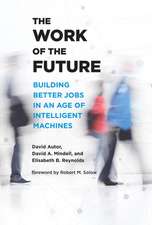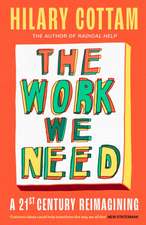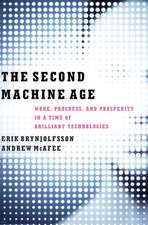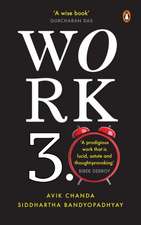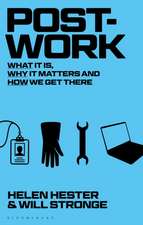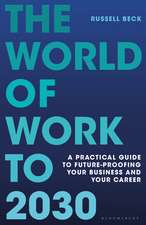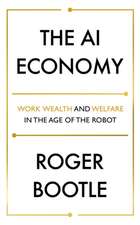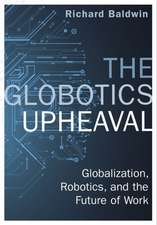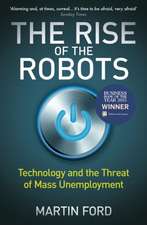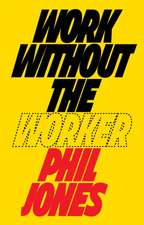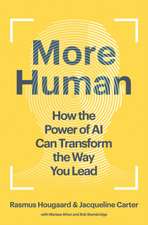Work in the Future: The Automation Revolution
Editat de Robert Skidelsky, Nan Craigen Limba Engleză Paperback – 23 mar 2020
Preț: 207.31 lei
Puncte Express: 311
Preț estimativ în valută:
36.64€ • 43.11$ • 31.98£
36.64€ • 43.11$ • 31.98£
Carte disponibilă
Livrare economică 16-30 martie
Livrare express 28 februarie-06 martie pentru 23.16 lei
Specificații
ISBN-13: 9783030211332
ISBN-10: 3030211339
Pagini: 146
Ilustrații: XIII, 211 p.
Dimensiuni: 148 x 210 x 13 mm
Greutate: 0.28 kg
Ediția:1st ed. 2020
Editura: Springer International Publishing
Colecția Palgrave Macmillan
Locul publicării:Cham, Switzerland
ISBN-10: 3030211339
Pagini: 146
Ilustrații: XIII, 211 p.
Dimensiuni: 148 x 210 x 13 mm
Greutate: 0.28 kg
Ediția:1st ed. 2020
Editura: Springer International Publishing
Colecția Palgrave Macmillan
Locul publicării:Cham, Switzerland
Cuprins
1. Introduction- Robert Skidelsky and Nan Craig.- 2. The Future of Work - Robert Skidelsky.- Part I: Work in the Past.- 3. Patterns and Types of Work in the Past: Part 1 - Richard Donkin.- 4. Patterns and Types of Work in the Past: Part 2 - Richard Sennett.- 5. Patterns and Types of Work in the Past: Wageworker and Housewife from a Global Perspective: Birth, Variations and Limits of the Modern Couple- Andrea Komlosy.- Part II: Attitudes to Work.- 6. Attitudes to Work and the Future of Work: the view from economics - David A. Spencer.- 7. Attitudes to Work - Pierre-Michel Menger.- 8. Work as an Obligation - Nan Craig.- Part III: Attitudes to Technology.- 9. Attitudes to Technology: Part 1 - Jim Bessen.- 10. Attitudes to Technology: Part 2 - Carl Benedikt Frey.- Part IV: Possibilities and Limitations for AI: What can’t machines do?.- 11. What Computers Will Never Be Able To Do - Thomas Tozer.- 12. Possibilities and Limitations for AI: what can’t machines do? - Simon Colton.- Part V: Work in the Digital Economy.- 13. Work in the Digital Economy - Daniel Susskind.- 14.Two Myths about the Future of the Economy - Nick Srnicek.- Part VI: AI, Work and Ethics.- 15. AI, Ethics, and the Law - Cathy O'Neil.- Part VII: Policy.- 16. Policy for the Future of Work - David Graeber.- 17. Automation and Working Time in the UK - Rachel Kay.- 18. Shaping the Work of the Future: Policy Implications - Irmgard Nubler.
Notă biografică
Robert Skidelsky is Emeritus Professor of Political Economy at Warwick University, UK and Chair of the Centre for Global Studies, London, UK. His three-volume biography of John Maynard Keynes won five prizes and his book on the financial crisis, Keynes: The Return of the Master, was published in September 2010. He was made a member of the House of Lords in 1991, where he sits on the cross-benches, and was elected as a fellow of the British Academy in 1994. How Much is Enough? The Love of Money and the Case for the Good Life was published in July 2012. His most recent publications were as author of Britain Since 1900: A Success Story? (2014), The Essential Keynes (2015), Markets and Morals (Palgrave Macmillan, 2015), Who Runs the Economy (Palgrave Macmillan, 2016), and Austerity vs. Stimulus (Palgrave Macmillan, 2017).
Nan Craig is Programme Director at the Centre for Global Studies, London, UK. She studied politics and international studies at the University of Warwick, UK, and global politics at the London School of Economics, UK. She co-authored Who Runs the Economy? (Palgrave Macmillan, 2016) with Robert Skidelsky.
Nan Craig is Programme Director at the Centre for Global Studies, London, UK. She studied politics and international studies at the University of Warwick, UK, and global politics at the London School of Economics, UK. She co-authored Who Runs the Economy? (Palgrave Macmillan, 2016) with Robert Skidelsky.
Textul de pe ultima copertă
This short, accessible book seeks to explore the future of work through the views and opinions of a range of expertise, encompassing economic, historical, technological, ethical and anthropological aspects of the debate. The transition to an automated society brings with it new challenges and a consideration for what has happened in the past; the editors of this book carefully steer the reader through future possibilities and policy outcomes, all the while recognising that whilst such a shift to a robotised society will be a gradual process, it is one that requires significant thought and consideration.
Caracteristici
Addresses the topic of automation and AI via a holistic approach to cover a range of interdisciplinary perspectives Considers how work, attitudes to work, and relationships with work, have changed in the past and what that can tell us about the future Presents views from a selection of highly regarded academics
